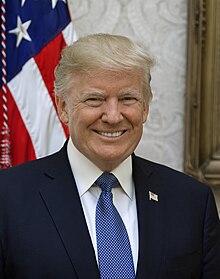Draft:Cultural impact of Donald Trump
 | Draft article not currently submitted for review.
This is a draft Articles for creation (AfC) submission. It is not currently pending review. While there are no deadlines, abandoned drafts may be deleted after six months. To edit the draft click on the "Edit" tab at the top of the window. To be accepted, a draft should:
It is strongly discouraged to write about yourself, your business or employer. If you do so, you must declare it. Where to get help
How to improve a draft
You can also browse Wikipedia:Featured articles and Wikipedia:Good articles to find examples of Wikipedia's best writing on topics similar to your proposed article. Improving your odds of a speedy review To improve your odds of a faster review, tag your draft with relevant WikiProject tags using the button below. This will let reviewers know a new draft has been submitted in their area of interest. For instance, if you wrote about a female astronomer, you would want to add the Biography, Astronomy, and Women scientists tags. Editor resources
Last edited by ElijahPepe (talk | contribs) 35 days ago. (Update) |
Donald Trump, the 45th president of the United States, has had a profound and controversial impact on American culture. His tenure and persona have influenced various aspects of society, politics, media, and public discourse, generating both fervent support and intense opposition.
Media and Communication
[edit]Social Media Presence
[edit]Trump's prolific use of Twitter redefined political communication, bypassing traditional media channels. His direct and often incendiary tweets resonated with supporters but also incited backlash and polarization. His ban from major platforms following the 2021 United States Capitol attack highlighted the role of social media in political discourse and the power of tech companies in moderating content.
Mainstream Media
[edit]The relationship between Trump and mainstream media was contentious. He popularized the term "fake news" to dismiss unfavorable coverage, undermining public trust in journalism. The media, in turn, often portrayed Trump negatively, focusing on controversies and scandals. This adversarial dynamic heightened the division between conservative and liberal media consumers.
"Alternative Facts" and Misinformation
[edit]The term "alternative facts," coined by advisor Kellyanne Conway, epitomized the administration's approach to truth and misinformation. This contributed to a broader cultural shift where objective facts were often overshadowed by partisan interpretations, complicating public understanding of reality.
Pop Culture and Entertainment
[edit]Television and Film
[edit]Trump's presidency inspired numerous portrayals in television and film, often critical. Shows like Saturday Night Live and The Late Show with Stephen Colbert featured frequent satirical segments about Trump, reflecting and shaping public opinion. Documentaries and films, such as Fahrenheit 11/9 by Michael Moore, examined his impact critically.
Literature
[edit]The Trump era spawned a plethora of books analyzing his influence, ranging from critical exposés like Michael Wolff's Fire and Fury to more sympathetic accounts by conservative authors. The publishing boom underscored the intense public interest and division over Trump's legacy.
Social and Political Movements
[edit]Rise of Populism
[edit]Trump's rise was emblematic of a global surge in populism, characterized by anti-establishment sentiments and nationalist rhetoric. His campaign and presidency energized a segment of the electorate disillusioned with traditional politics, influencing conservative movements worldwide.
The Resistance
[edit]Opposition to Trump galvanized a broad coalition known as "The Resistance," encompassing grassroots organizations, progressive activists, and mainstream Democratic politicians. The Women's March, held the day after Trump's inauguration, became one of the largest protests in U.S. history, symbolizing widespread dissent.
Black Lives Matter and Social Justice
[edit]Trump's responses to racial issues, particularly his handling of the Charlottesville rally and police brutality protests, were widely criticized. His rhetoric and policies often appeared to exacerbate racial tensions, amplifying the urgency of the Black Lives Matter movement and other social justice causes.
Policy and Governance
[edit]Immigration and the Border Wall
[edit]Trump's hardline stance on immigration, epitomized by the construction of the border wall, polarized the nation. Supporters saw it as a necessary measure for national security, while critics viewed it as xenophobic and ineffective. The family separation policy at the border drew particular condemnation, highlighting ethical concerns in immigration enforcement.
Healthcare and the Affordable Care Act
[edit]Trump's efforts to repeal the Affordable Care Act (ACA) underscored his administration's impact on healthcare policy. While repeal attempts ultimately failed, the administration's actions weakened the ACA, affecting millions of Americans' access to healthcare.
Environmental Policies
[edit]Trump's withdrawal from the Paris Agreement and deregulation of environmental protections marked a significant shift in U.S. climate policy. These actions were lauded by industry groups but criticized by environmentalists and scientists, reflecting a broader debate on environmental stewardship versus economic growth.
Legacy and Ongoing Influence
[edit]Trump's presidency left a lasting imprint on American culture and politics. His influence persists in the continued polarization of the electorate, the transformation of the Republican Party, and the ongoing debates over media credibility and democratic norms. The 2020 election and its aftermath, including the January 6 Capitol riot, further cemented his controversial legacy.

